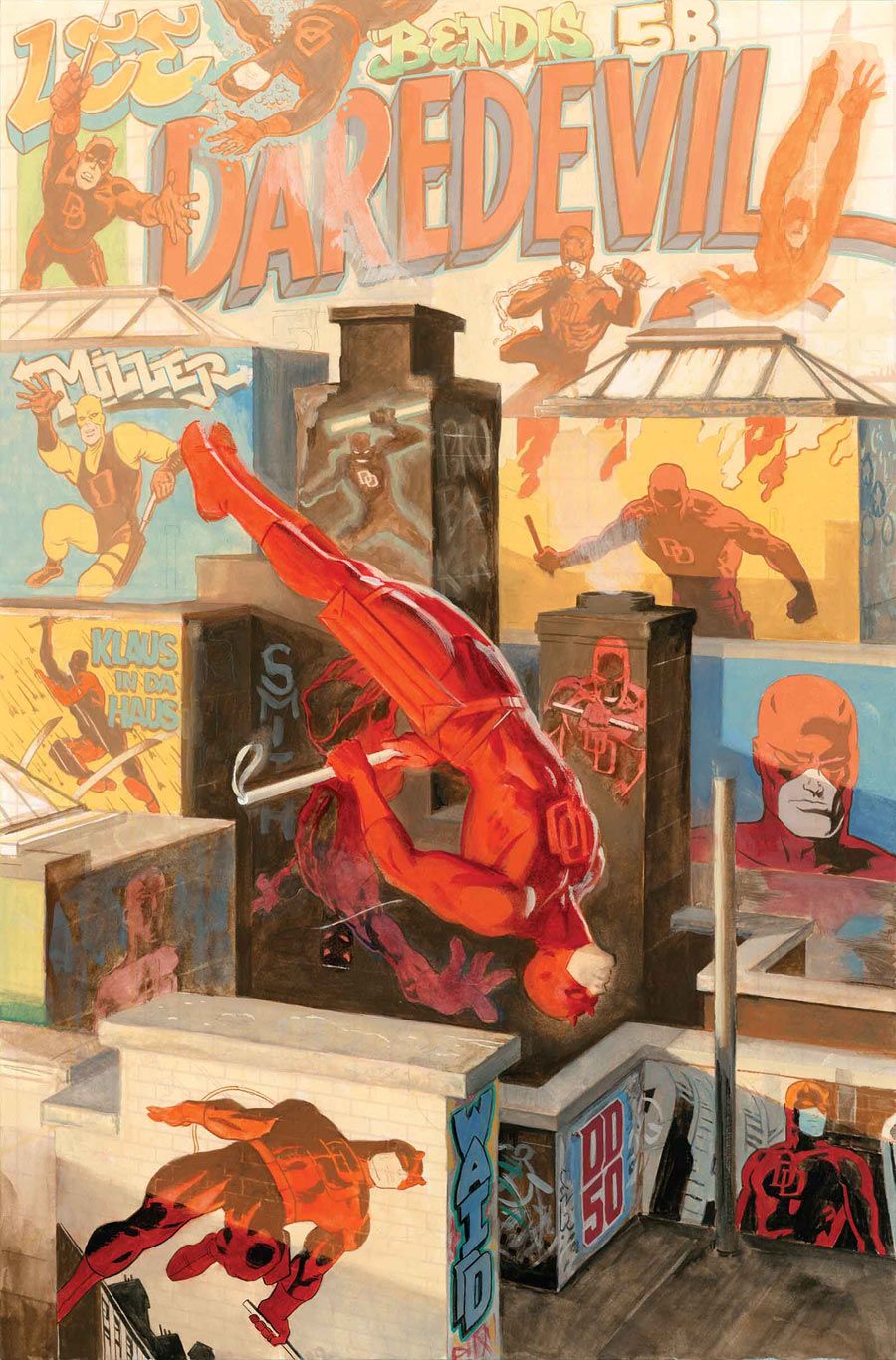You only turn fifty once, so Daredevil gets an appropriately numbered birthday celebration in the form of "Daredevil" #1.50, a supersized issue containing a trilogy of "imaginary stories" featuring a future Matt Murdock as he himself reaches the half-centennial mark. That's the only common thread connecting these three otherwise unrelated and diverse tales, each by a different creative team, and all are well-crafted stories evocative of the creative era that they represent. Mark Waid and Javier Rodriguez' leadoff tale "The King in Red" sits comfortably alongside Waid's current fun and free-spirited run, Brian Michael Bendis and Alex Maleev's untitled entry reprises the gritty, urban feel from their stay on the book a decade or so ago, and "The Last Will and Testament of Mike Murdock" is a lighthearted homage one of the wackier ideas from the classic Stan Lee / Gene Colan era.
Waid and Rodriguez' story could have filled a normal-sized issue, but its future setting makes it a better fit here. It doesn't take twenty plus pages for either creator to wow readers, though. As early as the second page, Waid lobs a surprising curveball, and Rodriguez' full-page illustration captures that surprise in a very detailed and unsettling fashion. Waid doesn't coast along after that, either; another twist drops a mere two pages later. From here, Waid explores the relationship between Matt, now a dad with a young son who is decidedly not shaping up to be a man without fear like his old man, although with good reason.
It's a believable and clever sort of role reversal on the relationship Matt had with his own father; believable enough to the point where readers wonder how Matt can resist strangling such an annoying kid. It speaks to the strength of Matt's character, though, who knows better than anyone how it feels to be something other than what dear old Dad wants you to be. Waid ends up telling a wonderful parable of what it means to be a parent: unconditional love for one's children, no matter whom or how they turn out to be. It caps off with an incredibly satisfying and poetic ending, rivalling any DD story Waid has told so far. Along the way, Rodriguez adds little touches the make it fun to stop and examine, like some of the old DD memorabilia that adorns the walls, and a pretty cool looking near-future San Francisco.
Bendis and Maleev's effort that follows isn't really a comic story at all, but rather a five page illustrated text piece. The nature and context of the story demands that it be told a little differently, and it works out beautifully. The narrative is in the form of a note written by a woman revealed to be Matt's future wife, and it's a riveting and disturbing mixture of crime, drama, and romance, that's simultaneously both joyful and tragic. Maleev's shadowy, textured illustrations basically play the part of show to Bendis' tell, until the final page where the story takes a sinister turn, a turn spoken of only in generalities in Bendis' text but clearly indicated in Maleev's art. Even then, the exact circumstance remains hidden and unspoken, but in tandem the words and pictures strongly suggest all that really needs to be known, and this darkly understated method yields a very powerful ending that is surprisingly poignant for such a short and quickly read story.
The final piece is just flat out fun, and is a very pleasant surprise for those who thought they'd never see the return of Mike Murdock, Matt's flamboyant but fake twin brother. This plot device was one that, at best, was conveniently boxed up and put up in the rafters somewhere, thought by few to ever return. Nonetheless, return it does, right down to the character's pseudo-beatnik verbiage that Karl Kesel does about as well as Stan Lee did, and who also apes Stan Lee about as well as anyone has. Kurt Kesel and Tom Palmer do an even better job paying tribute to the late Gene Colan, respectfully mimicking one of the character's best artists, right down to the crooked panel layouts and striking, dynamic gymnastic poses as DD swings around from building to building.
Before readers see any of these stories, though, they're gobsmacked by Paolo Rivera's stunning cover, serving as the biggest tribute to The Man Without Fear that a single piece of art can allow. There are over a dozen different likeness worked into the cover, all paying tribute to past artists strongly associated with the character like Klaus Janson, John Romita and Frank Miller. The names of every notable creator who contributed to the book over the past fifty years are worked into the art as well. This cover a pretty bow on one incredible birthday present, and "Daredevil" #1.50 is one awesome party, whose biggest shortcoming is that it's simply too short.

